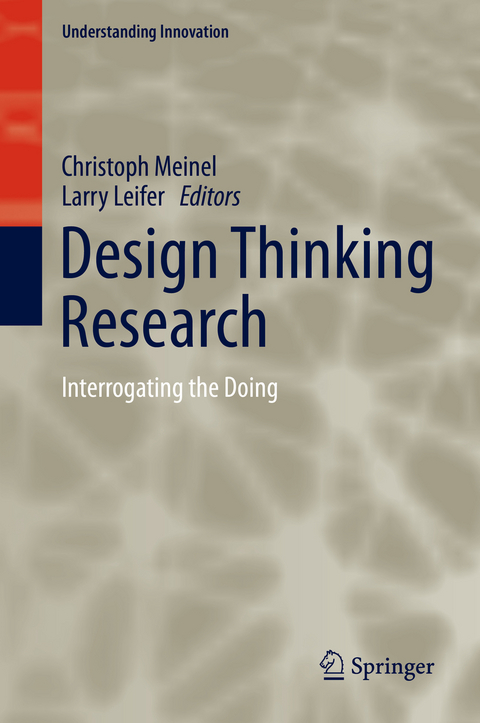
Design Thinking Research
Springer International Publishing (Verlag)
978-3-030-62036-3 (ISBN)
Extensive research conducted by the Hasso Plattner Design Thinking Research Program at Stanford University in Palo Alto, California, USA, and the Hasso Plattner Institute in Potsdam, Germany, has yielded valuable insights on why and how design thinking works. The participating researchers have identified metrics, developed models, and conducted studies, which are featured in this book, and in the previous volumes of this series.
This volume provides readers with tools to bridge the gap between research and practice in design thinking with varied real world examples. Several different approaches to design thinking are presented in this volume. Acquired frameworks are leveraged to understand design thinking team dynamics. The contributing authors lead the reader through new approaches and application fields and show that design thinking can tap the potential of digital technologies in a human-centered way. In a final section, new ideas in neurodesign at Stanford University andat Hasso Plattner Institute in Potsdam are elaborated upon thereby challenging the reader to consider newly developed methodologies and provide discussion of how these insights can be applied to various sectors.
Special emphasis is placed on understanding the mechanisms underlying design thinking at the individual and team levels. Design thinking can be learned. It has a methodology that can be observed across multiple settings and accordingly, the reader can adopt new frameworks to modify and update existing practice. The research outcomes compiled in this book are intended to inform and provide inspiration for all those seeking to drive innovation - be they experienced design thinkers or newcomers.Professor Dr. Christoph Meinel (Univ. Prof., Dr. sc. nat., Dr. rer. nat., 1954) is Director and CEO of the Hasso Plattner Institute for Digital Engineering gGmbH (HPI) and a full professor (C4) for computer science and serves as department chair of Internet Technologies and Systems at HPI. He teaches at the HPI School of Design Thinking and is Dean of the Digital Engineering Faculty of the University of Potsdam . In addition he is an honorary professor at the Department of Computer Sciences at Beijing University of Technology, guest professor at Shanghai University and concurrent professor at Nanjing University. Christoph Meinel is a research fellow at the Interdisciplinary Centre for Security, Reliability and Trust (SnT) at the University of Luxembourg. Meinel is a member of acatech, the German "National Academy of Science and Engineering", and numerous scientific committees and supervisory boards. Together with Larry Leifer from Stanford University he is program director of the HPI-Stanford Design Thinking Research Program. He is scientifically active in innovation research on all aspects of the Stanford innovation method "Design Thinking". Christoph Meinel is author/co-author of 13 books and 13 anthologies, as well as editor of various conference proceedings. More than 400 of his papers have been published in high-profile scientific journals and at international conferences. He is also editor-in -chief of "ECCC - Electronic Colloquium on Computational Complexity," "ECDTR - Electronic Colloquium on Design Thinking Research", the "IT-Gipfelblog" and the tele-TASK lecture archive and openHPI.
Larry Leifer is professor of Mechanical Engineering at Stanford University, CA, USA. Dr. Leifer's engineering design thinking research is focused on instrumenting design teams to understand, support, and improve design practice and theory. Specific issues include: design-team research methodology, global team dynamics, innovation leadership, interaction design, design-for-wellbeing, and adaptive mechatronic systems. Dr. Leifer has taught Design Innovation for decades and continues to redesign the course every year with new methodologies and technologies. Once a design student himself at Stanford University, he has started many design initiatives at Stanford including the Smart-Product Design Program, Stanford-VA Rehabilitation Engineering Center, Stanford Learning Laboratory, and most recently the Center for Design Research (CDR). A member of the Stanford faculty since 1976, his research themes include: creating collaborative engineering environments for distributed product innovation teams, instrumentation of those environments for design knowledge capture, indexing, reuse, and performance assessment, and design-for-wellbeing, socially responsible and sustainable engineering.
Theoretical Foundations of Design Thinking.- Part I: Effective Design Thinking Training and Practice.- Part II: Understanding Design Thinking Dynamics.- Part III: Design Thinking in Practice - New Approaches and Application Fields.- Part IV: Emerging of Neurodesign.
"This is a very comprehensive collection of diverse ideas on design thinking research, composed of well-written chapters by practitioners. It is like a research manifesto for design thinking. I recommend the book to anyone seriously thinking about or working on design thinking or a related field." (M. M. Tanik, Computing Reviews, November 3, 2022)
“This is a very comprehensive collection of diverse ideas on design thinking research, composed of well-written chapters by practitioners. It is like a research manifesto for design thinking. I recommend the book to anyone seriously thinking about or working on design thinking or a related field.” (M. M. Tanik, Computing Reviews, November 3, 2022)
| Erscheinungsdatum | 08.04.2021 |
|---|---|
| Reihe/Serie | Understanding Innovation |
| Zusatzinfo | VIII, 425 p. 106 illus., 28 illus. in color. |
| Verlagsort | Cham |
| Sprache | englisch |
| Maße | 155 x 235 mm |
| Gewicht | 816 g |
| Themenwelt | Mathematik / Informatik ► Mathematik ► Finanz- / Wirtschaftsmathematik |
| Wirtschaft ► Allgemeines / Lexika | |
| Wirtschaft ► Betriebswirtschaft / Management ► Unternehmensführung / Management | |
| Schlagworte | creative collaboration • design thinking • DTR • Hasso Plattner Institute • Human-Robot Interaction • Innovating creativity • IT Development • Multi team design • Neurodesign • Organizational Learning • School of design thinking • Social virtual reality • Stanford Design Thinking Research Program • Stanford D-School • team dynamics |
| ISBN-10 | 3-030-62036-0 / 3030620360 |
| ISBN-13 | 978-3-030-62036-3 / 9783030620363 |
| Zustand | Neuware |
| Informationen gemäß Produktsicherheitsverordnung (GPSR) | |
| Haben Sie eine Frage zum Produkt? |
aus dem Bereich


